May 2012 Archives
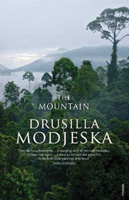 |
Drusilla Modjeska is best known for her non-fiction (Poppy, The Orchard and Stravinsky's Lunch being prime examples), but now she has decided to take a wander down the fiction road with her first novel The Mountain, She was recently interviewed by Geordie Williamson for "Readings": |
'Looking back, I think I was always a kind of novelist in hiding and I rather wish I'd learned the art of fiction after Poppy. I guess the reasons I didn't are complex - to do with having one foot in the university system, probably psychological reasons going back to childhood when I'd get into trouble for my 'stories' (my mother called them my embroidery!) and also a deep vein of interest in history which also goes right back to early days of school.'
Just as tough to resolve was the question of relations between history and invented experience, since Modjeska's academic background had in the past placed her on the other side of the divide. The challenge, she says, 'was learning to trust the characters as the foundation of the novel and let the history speak through them'. It is a measure of her success that the huge amounts of information contained in The Mountain - from the early years of independence to Highland bark-cloth design, traditional land ownership and forest exploitation - are allowed to unfold through characters' individual experience rather than editorials embedded in the text.
The question all of this information raises is more personal: to what degree has the author's life informed The Mountain? While Modjeska is at pains to explain that the novel is not autobiographical, she readily admits how deeply it has been informed by her time in Papua New Guinea (she did go into the field with her then husband, and completed a year at university in Port Moresby before moving to Australia in the early 1970s), by her return trips, and by her wide reading of history, poetry, fiction and anthropology by locals and outsiders. More recently, Modjeska's efforts to establish small-scale education and arts-based projects in two villages has renewed her ties to PNG:
'I like Hilary Mantel's phrase "informed imagination" and that's how I think of it, and what I hope I have come some way towards achieving. So yes, the "history", the background against which the lives and loves of the characters take shape is 'informed' and I hope will be recognisable to others who have lived through those extraordinary years, but it is as much an exercise in "imagination"... For instance, while Rika and Aaron are fully imagined characters, the conflicting pressures on them - political, emotional, cultural - are informed by what I have seen, and known (in others) and read.'
The shortlisted works are:
Fiction
All That I Am, Anna Funder
Sarah Thornhill, Kate Grenville
Foal's Bread, Gillian Mears
Autumn Laing, Alex Miller
Forecast: Turbulence, Janette Turner Hospital
Poetry
Ashes in the Air, Ali Alizadeh
Interferon Psalms, Luke Davies
Armour, John Kinsella
Southern Barbarians, John Mateer
New and Selected Poems, Gig Ryan
Non-fiction
A Short History of Christianity, Geoffrey Blainey
Michael Kirby Paradoxes and Principles, A J Brown
Kinglake-350, Adrian Hyland
When Horse Became Saw, Anthony Macris
An Eye for Eternity: The Life of Manning Clark, Mark McKenna
Prize for Australian History
1835: The Founding of Melbourne and the Conquest of Australia, James Boyce
The Biggest Estate on Earth, Bill Gammage
Breaking the Sheep's Back, Charles Massy
Indifferent Inclusion: Aboriginal People and the Australian Nation, Russell McGregor
Immigration Nation: The Secret History of Us, Renegade Films Australia Pty Ltd
Young Adult Fiction
A Straight Line to My Heart, Bill Condon
Being Here, Barry Jonsberg
Pan's Whisper, Sue Lawson
When We Were Two, Robert Newton
Alaska, Sue Saliba
Children's Fiction
Evangeline, The Wish Keeper's Helper, Maggie Alderson
The Jewel Fish of Karnak, Graeme Base
Father's Day, Anne Brooksbank
Come Down, Cat!, written by Sonya Hartnett and illustrated by Lucia Masciullo
Goodnight, Mice!, written by Frances Watts and illustrated by Judy Watson
Not sure when the winners will be announced.
It is rather amusing in reading the list of distinguished Australians whose portraits are to be placed in the Commonwealth Gallery, to find not one woman's name.
It is true that, in the making of Australia, the women who have contributed the most are those whose names are unknown to the public, though their memories are enshrined in the hearts of friends and families. They are women who have quietly taken their share of the burden, and walked shoulder to shoulder with their husbands through all the dangers of a new land; they are pioneer women who have bravely faced, and are still facing, the hardships and loneliness of the bush; they are the women who have worked unobtrusively at the making of good citizens; and for such women the nation itself is a monument, for without their part, the nation could not have come into being.
But out of the whole brave army of silent women there are a few who stand out as leaders, and those names are known to all. They are the women who have cut a path through the network of prejudice, and "blazed the trail" for their sisters following on behind them; and they have earned the right to the title of "distinguished Australians."
The first of these names which will come to every mind is that of Catherine Helen Spence, the "grand old woman" of Australia. Our State Children's Relief Departments stand in every state as an undying monument to Catherine Spence, and generations of children throughout the years will have cause to bless her name, which is known throughout the world. There was never politician yet who more nobly earned a place amongst the "distinguished Australians."
[Thanks to the National Library of Australia's newspaper digitisation project for this piece.]
This year's winners are:
Literature: "Long Grass Over Home" by Matthew Lamb
Poetry: "S.O.S." by Maria Zajkowski
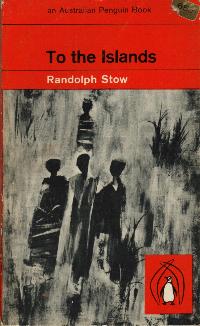
To the Islands by Randolph Stow, 1958
Pan edition 1962
His large blunt hands roved the staggered spines. Passed over several old Penguins -- mystery stroies in their fading green and white covers -- hesitated on a small thick copy of Devil on Two Sticks, perhaps a hundred years old. He pulled it out, turned the pages idly. Le Sage, William Tegg & Co., Cheapside, flyleaf missing. He replaced it beside the varnished volume of Swinburne. Decided that after all he would not read tonight.
From Hook's Mountain by James McQueen, Chapter 1 (1982)
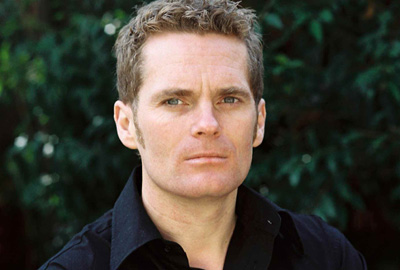 |
Sydney-based writer James Bradley was recently awarded the Pacall Prize as Australia's best critic. He publishes his reviews and critical essays in newspapers such as "The Age", "The Sydney Morning Herald" and "The Australian" as well as a number of Australian literary magazines. He also blogs at "City of Tongues" where he occasionally reprints his critical works. I've always liked James's reviews: he isn't genre-centric and is quite willing to review science fiction on television as well as literary novels. Added to that you always come away from one of his reviews knowing full well if the work under discussion is worth your time. A rare ability these days it seems. Stephen Romei interviewed James, after his win, for "The Australian": |
Q: James, congratulations on winning the Pascall. What does this award mean to you?
A: It's incredibly exciting and very flattering. But it's also slightly humbling, because I tend to think of myself as a jobbing writer rather than something as exalted as a critic.
Q: As the judges say, you are a practicioner-critic, someone who experiences both sides of the fence. How does this inform your approach to reviewing? And, more broadly, what are your principles for reviewing, what do you set out to achieve, in the review itself and in the wider cultural/literary discussion?
A: I think people tend to assume reviewing and writing are somehow at odds with each other, but I've never really felt they are. But I think novelists probably do approach books slightly differently to other readers, since it's difficult for us not to be aware of how mysterious the process of creation actually is, or to turn off that bit of the brain that is looking at the nuts and bolts and wiring and wondering how they pulled that off. Likewise as a writer I suspect you're a bit more aware of the way something sits in a living tradition: if somebody's writing about something the chances are it's responding to things you've thought about as well, or even written about, so there's a real thrill (and sometimes a little bit of envy) when you see someone really knock something out of the park. Whether any of that shows up on the page I don't know, but I think it's there nonetheless.
As for principles, someone once said that the only bad writing is dishonest writing, and I tend to agree. The best thing you can do is write from the heart and talk about how you felt and what you think. Part of that is about being honest about what you thought, but it's also about acknowledging your own prejudices and being prepared to acknowledge critical judgements are always provisional. I know a lot of the writing I'm proudest of is writing where I'm trying out ideas, or exploring something I'm not quite sure about. Partly that's because the best writing is always actively engaged with thinking something through, but it's also because it helps break down the barrier between the reader and the writer, and to make them part of the process. One of the reasons I hate pontificating in print is because critical writing should always be part of a conversation, and nothing kills a conversation quicker than some windy know-all.
Basically though, I write about books and film and television because I love them and find them endlessly pleasurable and exciting, and I want to find a way of sharing that passion. In my experience most critics are basically enthusiasts, and I'm no different.
To be writing yards of drivel for a tidy little screw;
You are young and educated and a clever chap you are,
But you'll never run a paper like the CAMBAROORA STAR
Though in point of education I am nothing but a dunce,
I myself -- you mayn't believe it -- helped to run a paper once
With a chap on Cambaroora, by the name of Charlie Brown,
And I'll tell you all about it if you'll take the story down.
On a golden day in when the sunrays were aslant,
Brown arrived in Cambaroora with a little printing plant
And his worldly goods and chattels --- rather damaged on the way ---
And a weary-looking woman who was following the dray.
He had bought an empty humpy, and, instead of getting tight,
Why, the diggers heard him working like a lunatic all night:
And next day a sign of canvas, writ in characters of tar,
Claimed the humpy as the office of the CAMBAROORA STAR.
Well, I cannot read, that's honest, but I had a digger friend
Who would read the paper to me from the title to the end;
And the STAR contained a leader running thieves and spielers down,
With a slap against claim-jumping, and a poem made by Brown.
Once I showed it to a critic, and he said 'twas very fine,
Though he wasn't long in finding glaring faults in every line;
But it was a song of Freedom --- all the clever critic said
Couldn't stop that song from ringing, ringing, ringing in my head.
So I went where Brown was working in his little hut hard by:
'My old mate has been a--reading of your writings, Brown,' said I ---
'I have studied on your leader, I agree with what you say,
'You have struck the bed-rock certain, and there ain't no get-away;
'Your paper's just the thumper for a young and growing land
'And your principles is honest, Brown; I want to shake your hand,
'And if there's any lumping in connection with the STAR,
'Well, I'll find the time to do it, and I'll help you --- there you are!'
Brown was every inch a digger (bronzed and bearded in the South),
But there seemed a kind of weakness round the corners of his mouth
When he took the hand I gave him; and he gripped it like a vice,
While he tried his best to thank me, and he stuttered once or twice.
But there wasn't need for talking --- we'd the same old loves and hates,
And we understood each other --- Charlie Brown and I were mates.
So we worked a little 'paddock' on a place they called the 'Bar',
And we sank a shaft together, and at night we worked the STAR.
Charlie thought and did his writing when his work was done at night,
And the missus used to 'set' it near as quick as he could write.
Well, I didn't shirk my promise, and I helped the thing, I guess,
For at night I worked the lever of the crazy printing-press;
Brown himself would do the feeding, and the missus used to 'fly' ---
She is flying with the angels, if there's justice up on high,
For she died on Cambaroora when the STAR began to go,
And was buried like the diggers buried diggers long ago.
Lord, that press! It was a jumper --- we could seldom get it right,
And were lucky if we averaged a hundred in the night.
Many nights we'd sit together in the windy hut and fold,
And I helped the thing a little when I struck a patch of gold;
And we battled for the diggers as the papers seldom do,
Though when the diggers errored, why, we touched the diggers too.
Yet the paper took the fancy of that roaring mining town,
And the diggers sent a nugget with their sympathy to Brown.
Oft I sat and smoked beside him in the listening hours of night,
When the shadows from the corners seemed to gather round the light ---
When his weary, aching fingers, closing stiffly round the pen,
Wrote defiant truth in language that could touch the hearts of men ---
Wrote until his eyelids shuddered --- wrote until the East was grey:
Wrote the stern and awful lessons that were taught him in his day;
And they knew that he was honest, and they read his smallest par,
For I think the diggers' Bible was the CAMBAROORA STAR.
Diggers then had little mercy for the loafer and the scamp ---
If there wasn't law and order, there was justice in the camp;
And the manly independence that is found where diggers are
Had a sentinel to guard it in the CAMBAROORA STAR.
There was strife about the Chinamen, who came in days of old
Like a swarm of thieves and loafers when the diggers found the gold ---
Like the sneaking fortune-hunters who are always found behind,
And who only shepherd diggers till they track them to the 'find'.
Charlie wrote a slinging leader, calling on his digger mates,
And he said: 'We think that Chinkies are as bad as syndicates.
What's the good of holding meetings where you only talk and swear?
Get a move upon the Chinkies when you've got an hour to spare.'
It was nine o'clock next morning when the Chows began to swarm,
But they weren't so long in going, for the diggers' blood was warm.
Then the diggers held a meeting, and they shouted: 'Hip hoorar!
Give three ringing cheers, my hearties, for the CAMBAROORA STAR.'
But the Cambaroora petered, and the diggers' sun went down,
And another sort of people came and settled in the town;
The reefing was conducted by a syndicate or two,
And they changed the name to 'Queensville', for their blood was very blue.
They wanted Brown to help them put the feathers in their nests,
But his leaders went like thunder for their vested interests,
And he fought for right and justice and he raved about the dawn
Of the reign of Man and Reason till his ads. were all withdrawn.
He was offered shares for nothing in the richest of the mines,
And he could have made a fortune had he run on other lines;
They abused him for his leaders, and they parodied his rhymes,
And they told him that his paper was a mile behind the times.
'Let the times alone,' said Charlie, 'they're all right, you needn't fret;
'For I started long before them, and they haven't caught me yet.
'But,' says he to me, 'they're coming, and they're not so very far ---
'Though I left the times behind me they are following the STAR.
'Let them do their worst,' said Charlie, 'but I'll never drop the reins
'While a single scrap of paper or an ounce of ink remains:
'I've another truth to tell them, though they tread me in the dirt,
'And I'll print another issue if I print it on my shirt.'
So we fought the battle bravely, and we did our very best
Just to make the final issue quite as lively as the rest.
And the swells in Cambaroora talked of feathers and of tar
When they read the final issue of the CAMBAROORA STAR.
Gold is stronger than the tongue is --- gold is stronger than the pen:
They'd have squirmed in Cambaroora had I found a nugget then;
But in vain we scraped together every penny we could get,
For they fixed us with their boycott and the plant was seized for debt.
'Twas a storekeeper who did it, and he sealed the paper's doom
Though we gave him ads. for nothing when the STAR began to boom:
'Twas a paltry bill for tucker, and the crawling, sneaking clown
Sold the debt for twice its value to the men who hated Brown.
I was digging up the river, and I swam the flooded bend
With a little cash and comfort for my literary friend.
Brown was sitting sad and lonely with his head bowed in despair,
While a single tallow candle threw a flicker on his hair,
And the gusty wind that whistled through the crannies of the door
Stirred the scattered files of paper that were lying on the floor.
Charlie took my hand in silence --- and by-and-by he said:
'Tom, old mate, we did our danmedest, but the brave old STAR is dead.'
Then he stood up on a sudden with a face as pale as death,
And he gripped my hand a moment, while he seemed to fight for breath:
'Tom, old friend,' he said, 'I'm going, and I'm ready to --- to start,
'For I know that there is something --- something crooked with my heart.
'Tom, my first child died. I loved her even better than the pen ---
'Tom --- and while the STAR was dying, why, I felt like I did THEN.
'Listen! Like the distant thunder of the rollers on the bar ---
Tom! I hear the --- diggers --- shouting: 'Bully for the STAR!
First published in The Boomerang, 19 December 1891
Helen Garner's novel The Spare Room is being adapted for the stage by British actors Eileen Atkins and Vanessa Redgrave. Atkins was looking for a play with a "lighter touch", couldn't find anything and so decided to write her own. Garner seems impressed.
Sophie Cunningham has announced on Twitter that she is the new head of the Literature Board. What happened to press releases?
Max Barry explains why it takes so long for a book to go from draft to bookshop.
W.H. Chong has been designing the covers for the new range of Text Classics that are out and about - the yellow ones, you can't miss them. He's giving a talk, about the process he goes through to produce a cover design, at the Wheeler Centre in Melbourne on May 31st.
Lisa Hill, of the ANZ LitLovers blog, has been named Best Australian Blog (Words category). Very well done indeed.
The original E.L. James book Fifty Shades of Grey is now a trilogy - well, I suppose it was always going to be, it's just that they are all finally out there - and "The New York Times" is reporting that the series has now sold over 10 million copies in the US alone. It has also been sold to around 37 countries and the film rights have been snapped up.
On the Meanjin blog Chris Flynn contemplates the problems of shifting all the books when moving house. His plan was to cull - moving all those that missed the cut to a storage unit - and only keeping those books he truly needed. Nice idea, but just remember the implications of the title of Anthony Powell's novel Books Do Furnish a Room.
Book of the Year
All That I Am by Anna Funder (Penguin)
Newcomer of the Year (debut writer)
Past the Shallows by Favel Parrett (Hachette)
Literary Fiction Book of the Year
All That I Am by Anna Funder (Penguin)
General Fiction Book of the Year
Sarah Thornhill by Kate Grenville (Text)
Biography of the Year
Franklin and Eleanor: An Extraordinary Marriage by Hazel Rowley (MUP)
General Non-fiction Book of the Year
Worse Things Happen At Sea by William McInnes & Sarah Watt (Hachette)
Illustrated Book of the Year
Tasting India by Christine Manfield (Lantern)
Book of the Year for Younger Children (age range 0 to 8 years)
Rudie Nudie by Emma Quay (ABC Kids)
Book of the Year for Older Children (age range 8 to 14 years)
The 13-Storey Treehouse by Andy Griffiths (Pan Macmillan)
Independent Bookseller of the Year
Shearer's Bookshop (NSW/ACT)
Chain / Franchise Bookseller of the Year
Hill of Content Bookshop (Balmain, NSW/ACT)
Specialist Bookseller of the Year
Boffins Bookshop (WA)
Regional Bookseller of the Year
Fullers Bookshop (Launceston, TAS)
Bookseller Promotional Campaign of the Year
Avid Reader for National Bookshop Day
Small Publisher of the Year
Text Publishing
Publisher of the Year
Allen & Unwin
Distributor of the Year
United Book Distributors
Publisher Promotional Campaign of the Year
Random House for Vintage Classics
International Success of the Year
Penguin Group for Midnight in Peking by Paul French
Book Industry Digital Innovation Award
ReadHowYouWant
You can read the full shortlists here.
No Books.
The problem of what to do with our books in an ordinary house, where no room is set apart for a library, is a very real one. Books have an exuberant habit of increasing by compound interest, and people who like a place for everything, and everything in its place, come to consider an overflow of books as just so much rubbish to be removed. People of that temperament, though, have their own remedy, a very sound one, if only it is used in time. The good old way, the simple plan: If you don't want to be faced with difficulties about books, don't have any books. Refuse to collect them, either for yourself or your family. Ignore them. Evict them. Personally, I don't know how this is done. I couldn't do it, but I know there are homes where books are simply eliminated; I have seen them; we have all seen them. You look round a room and see tables, chairs, flowers perhaps, a gramophone perhaps, but no disturbing element in the form of books. With regard to books, the room is as bare as the back of your hand. Now I call that masterly: ingene solitude. Those who actually love, books, the disturbers of our mental peace, may deplore the barrenness of such rooms. Perhaps in some moods I do so myself. Still, one must admire the consistently bare surface presented to the eye and mind. "They make a desert and call, it peace." Somehow it's hard to find ex- pressions of unmixed admiration for the achievement of bookless calm! Yet I repeat it; the achievement is masterly, and I don't know how it is done.
Books As Upholstery.
Once or twice it has happened to me, as it may happen to the best of us, to stay in a house where the choice of books was simply inexplicable. One was the home of a wealthy widow, who had just had her whole house redecorated and refurnished. The room where I slept had a elaborate fireplace, and the mantelpiece had several little brackets and shelves at the sides. The shelves could not be left empty, but they would not hold large books; besides, this was a bedroom, unfit for large tomes. The upholsterer had evidently realised this; for he had supplied, along with the elaborate mantelpiece, twelve inches of short books to fill each of the shelves. The most becoming series of books that would fit those shelves happened to be the series known as the Temple Classics, bound in soft green kid, very delightful. Twelve inches of those books gave you quite a selection. Three volumes of Dante, three of Sterne, two of Matthew Arnold, Abelard, and Heloise, a good deal of Carlyle, "much riches in a little room"' indeed! The trouble was, though, that the upholsterer had gauged the space on the shelves so well that none of the books would come out. He had also, I fancy, chosen them "classical" in hopes that nobody would ever want to take them out, as he did not want them disturbed. As for me, I felt that I now knew the meaning of the words, "spirits on prison."
Another Solution.
You can deal with books by refusing to deal with them at all, that is by abolishing them. You can solve the problem by treating them as upholstery and never reading them. Other people, again, though fond of books, honestly dislike seeing them about a room. It is a distaste that I cannot understand, but I suppose some people feel the same about their friends, enjoying their existence, but not wanting to be made aware of it too often. Lately I came across this description, for instance, in Wells' book, "The World of William Clissold." The writer is describing his simple and delightful study, and says:
There is a large cupboard in which books are hidden, for the backs of modern books, if they are displayed, talk overmuch.
So you hide them in a cupboard, where they might be rifles, or jam-pots, or old boot ! So if you, enter that room, admitted to be a study, you would not be aware of the presence of books at all! Most of us have seen rooms that came to be called "study," in which there actually were no books; probably a drawer containing fishing-tackle was their nearest approach to the material of meditation. But Clissold has books, and has a comfortable home for them, only he condemns them to lie concealed. His reason is that the backs of modern books are too blatant, and perhaps that is true. We have learnt the ways of reclame too thoroughly. Every book is its own advertisement right up to the day of its death, especially since the glaring jackets have been made so attractive that people seldom have the courage to discard them. Well, Clissold solves the problem to his own satisfaction; a book should he read but not seen. He is entitled to his own choice.
More Positive Pleasure.
All these solutions, it will be noticed are negative. They are ways of treating books so that we are almost untroubled by them. What about people who enjoy the troubling things? Even apart from their contents, for instance, French books are probably the most troublesome of all, for they are bound in thin paper. The theory is that you are a wealthy person with a well-established library and a pretty taste in bind-ings. What you want, then, is a well-printed book on good paper; to you the temporary binding, which the book wears when you buy it, is negligible, as you intend to have the book bound at once by your ancestral book-binder. He will use the special morocco or calf, or half-calf (I always wonder which end of a calf they use for that), which will agree with all the other volumes in your collection. Good. But most people are not like you; the paper cover in which a book is born is good enough for them. The book falls to pieces soon; so much the better for the booksellers. And besides, how attractive those French books can be in their fresh paper covers! Leaving aside those that are in covers with pictures, there are those enormous series in an inconspicuous lemon-yellow. No, not, "yellowbacks." This binding can cover anything from the sermons of Bossuet to the latest word by Proust's successors; the point is its fresh attractiveness. Somewhere in his novel of Paris life, "The Ambassadors," Henry James grows positively lyrical about those yellow books, comparing them with a mass of fresh fruit, ripe and enticing. You feel they are coloured by the sheer presence of vitamines. Who could bear to hide such treasures in a cupboard? Besides, the lettering on their backs is discreet; their delicate personality it is that beckons. And Henry James was not alone in feeling that enticement.
When Books Take Charge.
So far I have discussed people who know how to keep books in their place. Is the reverse picture too gloomy to be borne? Shall I tell you what a home is like when books take control, hold the helm, steer the car, wield the lash, and sa forth? Well, this is the way it goes. You move into a new house, even temporarily. You. find there is only one bookshelf, and you construct another, which should be more than enough, as you will not spend more than a few months here. In three months' time, what has happened? Well, the few books you had when you came are still there, but unnoticeable, among the hundred or so more that have accumulated. "Like breeds like"; is that it? Some of the new ones are real acquisitions; you will never part with them. Others are horrible accidents that have occurred to you because So-and-so wanted to try to convince you of double-tax, or auto-ventriloquism, or how to make wine from papaws. What does one do with books like this? That, I admit, is a real problem. One can't take them up and write on the flyleaf, "To Mary, with love," because then Mary will read the book as from you, and will imbibe its doctrine as yours and tell her friends you're a double-taxer who lives on papaw wine. The thing to do with these books in the end, I suppose, is to dump them very anonymously somewhere. Meanwhile, they help to crowd our real books off the two small shelves. Suddenly some one wants to look up something in the small Shelley that is always being submerged by heavier books: small Shelley lurks darkling. Every consultation of him is a crisis:
Lest storms should overset the leaning pile
Deciduous, or its own unbalanced weight.
Cowper's haystack knew all about our book problems. Meanwhile, by facing those dreadful risks of collapse and of flooding, we have at least a small Shelley at hand, and can read aloud a chapter of James Stephens' "Crook of Gold" when "the world is too much with us." We have some poems and novels that their writers have sent us, and that no one can be allowed to borrow. We have above all the sense of abundant life, the overflowing life of the mind, that the visible presence of books can really give. I admit that it is a disturbing presence, but a seed, in the ground is also disturbing when it insists on germinating. After all, some one else must put the case for the swept and garnished room, devoid of books. I cannot put it fairly, for I am too willing that books should have it all their own way.
First published in The Brisbane Courier, 20 August 1927
[Thanks to the National Library of Australia's newspaper digitisation project for this piece.]
The Barbara Jefferis Award is an annual prize. It is awarded to "the best novel written by an Australian author that depicts women and girls in a positive way or otherwise empowers the status of women and girls in society". It can be in any genre and does not have to be set in Australia, nor written by a woman.
You can read the shortlist here.
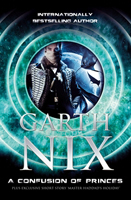 |
Garth Nix has turned his hand to space opera with his new novel, A Confusion of Princes. The book was released in Australia in mid-April, and in the UK and USA in mid-May. The author was interviewed by Michael Levy for "Publishers Weekly". |
Although you've written science fiction in the past, you're best known for your fantasy series. Why write one versus the other?
I'm not sure that there's anything that you can't do in either form. In any genre you're working in you can always find a way to tell a particular kind of story. I love fantasy, I love science fiction, I love all kinds of fiction, in fact. I don't particularly know why I chose to write a science fiction story except that the book seemed to lend itself to a science-fictional setting. I could probably have written it as fantasy, too - a story about a vast empire and near-immortal princes who are reborn and who are superior to normal humans in many ways except ethically, but for some reason I wanted to write a space opera adventure so that's the story that came out. A Confusion of Princes has a classic coming-of-age structure, it's a bildungsroman, so the core characteristics of the story, the setting and the tropes, are less important than the human story at the center.
A Confusion of Princes is dedicated to Robert A. Heinlein and Andre Norton, the best YA science fiction writers of the mid-20th century. What does Princes owe them?
I've dedicated the book to Heinlein and Norton because their young adult books were very important to me growing up. One of the things I wanted to do with A Confusion of Princes was to write a modern version of the kind of adventure story that I loved when I was young, and that I still read, one that will work for teenagers and adults, and hopefully that's what I've done. This is a naval story too, so there's probably some C.S. Forester in there, as well. Also, someone asked me the other day if I was a fan of Roger Zelazny's Amber books, which I am. They're about the political machinations of princes seeking power, so there's probably a Zelazny influence as well as many others. Authors are influenced by everything they've ever read. If you've read widely enough it helps you create your own mix.
In 2011 the Commonwealth Foundation re-organised the prizes to now make awards for Best Book (best first full-length novel) and Best Short Story. As previously winners are announced in each region and overall winner are also determined.
The regional winners for 2012 have been announced as:
Commonwealth Book Prize
Regional Winner, Africa
Jacques Strauss, South Africa The Dubious Salvation of Jack V, Jonathan Cape
Regional Winner, Asia
Shehan Karunatilaka, Sri Lanka, Chinaman: The Legend of Pradeep Mathew, Random House
Regional Winner, Canada and Europe
Riel Nason, Canada, The Town that Drowned, Goose Lane Editions
Regional Winner, Caribbean
Alecia McKenzie, Jamaica, Sweetheart, Peepal Tree Press
Regional Winner, Pacific
Cory Taylor, Australia, Me and Mr Booker, The Text Publishing Company
Commonwealth Short Story Prize
Regional Winner, Africa
Jekwu Anyaegbuna, Nigeria, Morrison Okoli (1955-2010)
Regional Winner, Asia
Anushka Jasraj, India, Radio Story
Regional Winner, Canada and Europe
Andrea Mullaney, UK, The Ghost Marriage
Regional Winner, Caribbean
Diana McCaulay, Jamaica, The Dolphin Catcher
Regional Winner, Pacific
Emma Martin, New Zealand, Two Girls in a Boat
The overall winners will be announced at the Hay Festival in the UK on June 8, 2012.
You can read details of all the shortlists here.The shortlists are:
Kibble Literary Award
Gail Jones - Five Bells
Gillian Mears - Foal's Bread
Charlotte Wood - Animal People
Dobbie Literary Award
Amy T. Matthews - End of the Night Girl
Favel Parrett - Past the Shallows
Leah Swann - Bearings
The winners will be announced on July 25, 2012.
"The Man Who Loved Children" by Christina Stead. (Peter Davies, London).
Australian-born Christina Stead, in "The Man Who Loved Children," has written an extraordinarily good novel of the disharmonious life of an American family.
It is a grim story set in an atmosphere of hatred, a realistic presentation of a ruthless egocentric and his unfortunate, harassed wife, who quarrel brutally and bitterly in front of their children.
But it has many amusing moments: the dialogue, of which there is a great deal, is witty, strikingly original, and some of the situations are riotously and robustly comic.
Sam Pollit, a fantastic figure, dominates the book. Head of a Scientific Department in Washington, he is a boastful buffoon, an idealistic egoist, who struts and performs before the appreciative audience of his six young children. He is forever talking, demonstrating bis love for the children, whining for sympathy against the im- possible conduct of their mother.
The mother, Henrietta, belongs to a wealthy family of Baltimore people, but, like the other Collyers, is wasteful, improvident and unreliable. She is a beautiful, headstrong creature when she marries the handsome, good-living widower, Sam Pollit, but marriage soon changes her. Finding Sam ungenerous with his money, she quickly gets in the toils of moneylenders, and for the rest of her life is dunned by them, always borrowing more to pay off interest, never having enough money for household expenses, always deceiving Sam about where the money goes.
At the beginning of the book the Pollits are living in a lovely, large house outside Washington, a house belonging to Henny's father. Here Sam revels in the garden, the little menagerie he has, and, of course, always the children. Henny, condemned to do the housework and the children's mending, complains bitterly, never speaks to Sam, lives on cups of tea, curry and aspirin, and has frequent trips to town to enjoy the company of a young admirer.
Then Sam, who is an anthropologist, is sent on an expedition to Malaya. His ways so irritate the head of the expedition that numerous complaints are made to Washington, with the result that, on.his return, Sam is suspended without pay. But worse is to come. Henny's father dies hopelessly in debt, and the Pollits have to move out of their grand home and take a tumbledown old house in a poor district outside Baltimore.
Here, while Sam potters happily about with his growing children, repairing, pulling down, and making himself generally a handyman, Henny frets, sells all her treasures to get money to meet the demands of the usurious lenders, and becomes more and more desperate.
All the time frightening quarrels go on, quarrels that lead Henny to the verge of insanity, that make Sam feel more righteous than ever. The end, of course, is tragedy for Henrietta, but some promise of a future for the overbearing Sam.
That is the bare outline of the book, but there is much more in it than that. It is a novel over which Christina Stead must have slaved to provide the right quality of scene, dialogue, characterisation. Her Sam Pollit is a memorable, larger-than-life figure, a contemptible character if ever there was one, yet a man whom we cannot wholly despise. Henrietta, on the other hand, is drawn as a rather sympathetic character, but we cannot keep patience with her dramatics, her threats of murder and suicide, and her flamboyant show of self-sacrifice.
The children are only sketched in on this large-size Pollit canvas, but their inclusion adds life and color to the picture.
The only gentleness in the book is in the chapters about the adolescent Louie, Sam's child by his first marriage, an ugly, clumsy girl, a slovenly drudge in the house, who yet has some thing of the poet in her, has her soul uplifted by her devotion to her teacher, and is the only one of the children to draw completely away from her domineering father.
It is on Louie that the atmosphere of hate in the house has the greatest effect: Louie precipitates the inevitable tragedy.
Besides the Pollit household, Miss Stead brings a number of other characters into the story--Sam's sisters, the large Collyer family, Louie's mother's relations, all oddities; and the more prosaic figures of the neighborhood, and Sam's office cronies and enemies.
Miss Stead is a writer with remarkable literary creative power. With this novel she comes to the peak of her career, assumes a place among the greatest novelists of the day. "The Man Who Loved Children" is a book that merits unqualified literary appreciation as well as providing rich and original reading entertainment.
First published in The Advertiser, 13 September 1941
[Thanks to the National Library of Australia's newspaper digitisation project for this piece.]
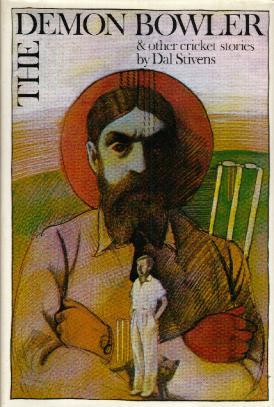
The Demon Bowler and Other Cricket Stories by Dal Stivens, 1979
Cover illustration by Ron Brooks
Outback Press edition 1979
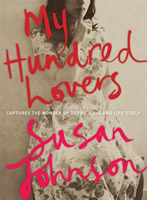 |
Susan Johnson's latest novel, My Hundred Lovers, is about to be released. The author spoke to Helen Greenwood for "The Age": |
Johnson's latest book, My Hundred Lovers, brings wit and ambition to a mock memoir by a woman called Deborah.
Johnson imagines Deborah's life through her bodily memories and devises a bold structure based on 100 sensual moments.
The lovers of the title are not what you might expect. Chapter 16 is ''Giggling'', chapter 49 is ''A dress'', chapter 67 is ''Breasts''. Of course, Johnson trawls through Deborah's sexuality. One chapter is called ''Three men in one day'' and in another we meet ''The Deflowerer, again''. The final, enigmatic chapter is simply ''The Hundredth Lover''.
''For women, sex, eroticism and sensuality are really linked; they are not compartmentalised,'' Johnson says. ''So when people ask is it literally 100 lovers, I say, no, it's actually 100 moments of the loving life of the body and the body's lovers.''
Her book knits together themes that run through her six other novels: eroticism and sensuality, expatriation, her love of France, writing and art, and the complexities of relationships between men and women.
The winners were:
Children's Fiction (told primarily through words)
City of Lies by Lian Tanner (Allen & Unwin)
Children's Fiction (told primarily through pictures)
Sounds Spooky by Christopher Cheng (author) and Sarah Davis (illustrator) (Random House Australia)
Young Adult Short Story
"Nation of the Night" by Sue Isle (Nightsiders, Twelfth Planet Press)
Young Adult Novel
Only Ever Always by Penni Russon (Allen & Unwin)
Illustrated Book / Graphic Novel
Hidden by Mirranda Burton (author and illustrator) (Black Pepper)
The Deep: Here Be Dragons by Tom Taylor (author) and James Brouwer (illustrator) (Gestalt Publishing)
Collection
Bluegrass Symphony by Lisa L. Hannett (Ticonderoga Publications)
Anthology
Ghosts by Gaslight edited by Jack Dann and Nick Gevers (Harper Voyager)
Horror Short Story
"The Past is a Bridge Best Left Burnt" by Paul Haines (The Last Days of Kali Yuga, Brimstone Press)
"The Short Go: a Future in Eight Seconds" by Lisa L. Hannett (Bluegrass Symphony, Ticonderoga Publications)
Horror Novel
No shortlist or winning novel
Fantasy Short Story
"Fruit of the Pipal Tree" by Thoraiya Dyer (After the Rain, FableCroft Publishing)
Fantasy Novel
Ember and Ash by Pamela Freeman (Hachette)
Science Fiction Short Story
"Rains of la Strange" by Robert N Stephenson (Anywhere but Earth, Coeur de Lion)
Science Fiction Novel
The Courier's New Bicycle by Kim Westwood (HarperCollins)
Peter McNamara Convenors' Award
Galactic Suburbia podcast - Alisa Krasnostein, Alex Pierce, Tansy Rayner Roberts, Andrew Finch (producer)
Kris Hembury Encouragement Award
Emily Craven of Adelaide
Clive James has recently released a new collection of poetry titled Nefertiti in the Flak Tower.
He spoke to Mark Colvin on the "Friday Late" program on ABC News.
Derwent May reviewed the collection for Standpoint magazine and titled his piece "Never a Dull Verse".
Daily Telegraph
James is the current, or possibly recent, television reviewer for "The Daily Telegraph" in the UK. His most recent columns are as follows:
April 12 - on The Syndicate
April 5 - Why British TV drama has lost the plot.
March 30 - They didn't see the iceberg? Neither did we
The Telegraph doesn't mention that James is on leave or why the most recent review is April 12.
Book Review
James reviews Masscult and Midcult by Dwight Macdonald for "The Atlantic":
"As with all great essayists, his writing had a poetic component, but it was a poetry cleansed of poeticism. No modern American prose writer of consequence ever postured less: compared with him, Mary McCarthy is on stilts, Gore Vidal grasps a pouncet-box, and Norman Mailer is from Mars in a silver suit. At his best, Macdonald made modern American English seem like the ideal prose medium: transparent in its meaning, fun when colloquial, commanding when dignified, and always suavely rhythmic even when most committed to the demotic.
"In fact, he seemed to get his rhythm from ordinary conversation: the hardest trick for a prose writer to pull off, because vulgarity always threatens. Macdonald, however, was poised even when he joked. His wonderful book Parodies--wonderful because the choosing is done with an ear for true wit--was constantly in print up until 1985, so he could never have quite been forgotten, but people did forget that his prose was interesting no matter what he talked about. Right through the war, he railed against the Allied bombing campaign. His humane articles never had a chance of affecting anything, because the Allied effort was dictated by the necessity to win, not by ethics; but the articles are still interesting. A dull paragraph wasn't in him."
Other
A comment forum which started in January 2008, in The Fortean Times, about an article that James wrote for The Monthly, is still going strong.
Bill Moyers interviews James on the publication of his book Cultural Amnesia. The video upload is dated 4 May 2012, but the book was released in 2007.
Is he who to my frailties lends
A cloak of charity, or sends
To me some kindly word;
Nor, when supinely I might yield,
To some mean foe an unfought field,
Would he, if I to him appealed,
Chide me, his friend, unheard.
Another friend I often find,
If I go wrong, who seems unkind,
Yet leaves me comforted, resigned,
After the pain is past.
He tells of the unequal fight
'Twixt my own weakness and the might
Of those all armored for the right;
How I might fail at last.
Some of my friends speak to me now
From 'neath the mounds where daisies grow,
They were the friends who loved me so --
Methinks they love me yet.
Each tells of virtue where was rife
All evil, and, amid the strife,
Each gave a noble, sacred life
To win a coronet.
And there are friends I always knew,
Yet dearer to me daily grew,
As, erst and ever, I'd pursue
My studies by their speech.
On shelves, in tomes, they stand and lie;
As we commune I smile or sigh;
En deshabille I am not shy
Of these, within my reach.
First published in The Australian Town and Country Journal, 20 August 1898
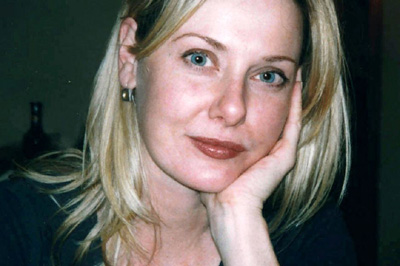 |
At the end of April Anna Funder was interviewed by Farid Farid for SBS. At the time of this interview the author's novel All That I Am had been longlisted for the Miles Franklin Award. That has since been upgraded to a shortlisting. |
The idea of refuge and exile figures in nuanced ways in your latest work, how do you feel in general towards Australia's stance with its treatment of refugees in their latest waves?
I was deeply depressed and bewildered by our treatment of refugees earlier this decade - and not only refugees. The careless exile of Vivian Solon, the reckless imprisonment of Cornelia Rau, who was mentally ill. It shames me that my country allowed refugees seeking asylum here from terrible situations to be imprisoned indefinitely without trial. It made me think very differently about what it was to be Australian. I felt that horrors were happening - suicides, hunger strikes, the permanent psychological maiming of children in suburbs not far from where I lived. I think to some extent it's still going on.
The gender controversy surrounding Miles Franklin has subsided this year with seven women including yourself being nominated for the prize, how do you feel about the whole debate?
I think that the statistics speak for themselves - too few great women writers are recognized in prizes, review space and reviewing. After that, it gets more complicated - a lot more complicated. Writing really well, independently and for the long haul takes vast repositories of self-confidence, a kind of self-belief that can be hard for sane, well-socialised women to sustain. But it can be done. And, of course, great works come also from the mad and anti-social among us too.
Best Novel
The Shattered City (Creature Court 2), Tansy Rayner Roberts (HarperCollins)
Burn Bright, Marianne de Pierres (Random House Australia)
Mistification, Kaaron Warren (Angry Robot Books)
The Courier's New Bicycle, Kim Westwood (HarperCollins)
Debris (The Veiled Worlds 1), Jo Anderton (Angry Robot Books)
Best Novella or Novelette
"The Sleeping and the Dead", Cat Sparks, in Ishtar (Gilgamesh Press)
"Above", Stephanie Campisi, in Above/Below (Twelfth Planet Press)
"The Past is a Bridge Best Left Burnt", Paul Haines, in The Last Days of Kali Yuga (Brimstone Press)
"And the Dead Shall Outnumber the Living", Deborah Biancotti, in Ishtar (Gilgamesh Press)
"Julia Agrippina's Secret Family Bestiary", Tansy Rayner Roberts, in Love and Romanpunk (Twelfth Planet Press)
"Below", Ben Peek, in Above/Below (Twelfth Planet Press)
Best Short Story
"Breaking the Ice", Thoraiya Dyer, in Cosmos 37
"Alchemy", Lucy Sussex, in Thief of Lives (Twelfth Planet Press)
"The Last Gig of Jimmy Rucker", Martin Livings and Talie Helene, in More Scary Kisses (Ticonderoga Publications)
"All You Can Do Is Breathe", Kaaron Warren, in Blood and Other Cravings (Tor)
"Bad Power", Deborah Biancotti, in Bad Power (Twelfth Planet Press)
"The Patrician", Tansy Rayner Roberts, in Love and Romanpunk (Twelfth Planet Press)
Best Collected Work
The Last Days of Kali Yuga by Paul Haines, edited by Angela Challis (Brimstone Press)
Nightsiders by Sue Isle, edited by Alisa Krasnostein (Twelfth Planet Press)
Bad Power by Deborah Biancotti, edited by Alisa Krasnostein (Twelfth Planet Press)
Love and Romanpunk by Tansy Rayner Roberts, edited by Alisa Krasnostein (Twelfth Planet Press)
Ishtar, edited by Amanda Pillar and K. V. Taylor (Gilgamesh Press)
Best Artwork
"Finishing School", Kathleen Jennings, in Steampunk!: An Anthology of Fantastically Rich and Strange Stories (Candlewick Press)
Cover art, Kathleen Jennings, for The Freedom Maze (Small Beer Press)
Best Fan Writer
Tansy Rayner Roberts, for body of work including reviews in Australian Speculative Fiction in Focus! and Not If You Were The Last Short Story On Earth
Alexandra Pierce, for body of work including reviews in Australian Speculative Fiction in Focus!, Not If You Were The Last Short Story On Earth, and Randomly Yours, Alex
Robin Pen, for "The Ballad of the Unrequited Ditmar"
Sean Wright, for body of work including "Authors and Social Media" series in Adventures of a Bookonaut
Bruce Gillespie, for body of work including "The Golden Age of Fanzines is Now", and SF Commentary 81 & 82
Best Fan Artist
Rebecca Ing, for work in Scape
Lisa Rye, for "Steampunk Portal" series
Dick Jenssen, for body of work including work in IRS, Steam Engine Time, SF Commentary and Scratchpad
Kathleen Jennings, for work in Errantry (tanaudel.wordpress.com) including "The Dalek Game"
Rhianna Williams, for work in Nullas Anxietas Convention Programme Book
Best Fan Publication in Any Medium
SF Commentary, edited by Bruce Gillespie
The Writer and the Critic, Kirstyn McDermott and Ian Mond
The Coode Street Podcast, Jonathan Strahan and Gary K. Wolfe
Galactic Chat, Alisa Krasnostein, Tansy Rayner Roberts and Sean Wright
Galactic Suburbia, Alisa Krasnostein, Tansy Rayner Roberts, and Alex Pierce
Best New Talent
Steve Cameron
Alan Baxter
Joanne Anderton
William Atheling Jr Award for Criticism or Review
Liz Grzyb and Talie Helene, for "2010: The Year in Review", in The Year's Best Australian Fantasy and Horror 2010 (Ticonderoga Publications)
Damien Broderick and Van Ikin, for editing Warriors of the Tao: The Best of Science Fiction: A Review of Speculative Literature (Borgo Press)
David McDonald, Tansy Rayner Roberts and Tehani Wessely for "Reviewing New Who" series, in A Conversational Life
Alexandra Pierce and Tehani Wessely, for reviews of Vorkosigan Saga, in Randomly Yours, Alex
Russell Blackford, for "Currently reading: Jonathan Strange and Mr Norrell by Susanna Clarke", in Metamagician and the Hellfire Club
The awards will be announced at Continuum 8, the 51st Australian National Science Fiction Convention to be held in Melbourne over the weekend of June 8-11 2012.

The Unicorn and Other Tales by Dal Stivens, 1976
The cover reproduces an original wood-block print by David Aspden
Wild & Woolley edition 1979
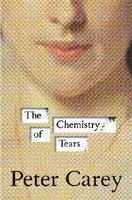 |
Nina Caplan interviews Peter Carey, for "New Statesman", as his latest novel is published in the US: |
Why is Carey so fond of these lurid, self-aggrandising lawbreakers? Most of his novels contain at least one. "I have a bad character." What, "Sumper, c'est moi"? He's joking, I think, and anyway, all characters are partially "moi". But this does seem an odd way to deflect my attention from his roots.
I can understand his reluctance: geographical stereotyping is reductive and Australians have suffered from this more than most. Until recently, white Australia was a fledgling, trying to emulate, overtake and detach itself from the mother country all at once; then there's the fraught history of white Australia's mistreatment of the original inhabitants. This book is partly about the difficulties we all have in seeing what we do not wish to see. Carey cites the New South Wales Aboriginals failing to register the incoming ships of the First Fleet "because they did not know such things existed"; a stunning piece of wilful blindness mirrored by the Englishmen, who then nearly died of starvation while surrounded by the indigenous notion of plenty. There is no tree of knowledge in the sunburned country - on the contrary. It occurs to me that if your homeland's original sin is all about obfuscation and you have ideas you wish to present clearly, it makes sense to take to your heels. Still, only an Australian would turn coming from Australia into the conversational equivalent of a crime.
But then, Carey writes incessantly about crime. His second book of short stories is entitled War Crimes; his first, The Fat Man in History, posits a post-Marxist world where being obese is a criminal activity. He invents thieves and liars and gambling addicts and, yes, convicts. As for Ned Kelly, Carey's extraordinary act of ventriloquism had the dubious distinction of making Australia's most notorious crim an international sensation. Of the central trio in The Chemistry of Tears, one, as we have seen, almost wound up a convict (he narrowly escaped becoming a parricide, too); another is a thieving, dipsomaniac horologist, and, while Henry seems the soul of probity, he might be said to be guilty of plagiarism - a favourite Carey sin.
The shortlists are:
Chain/Franchise Bookseller of the Year
NSW/ACT Hill of Content Bookshop (Balmain)
Qld Dymocks Indooroopilly
SA/NT Dymocks Adelaide
Tas Dymocks Hobart
Vic Hill of Content Bookshop (Melbourne)
WA Dymocks Garden City (Booragoon)
Independent Bookseller of the Year
NSW/ACT Shearer's Bookshop
Qld Avid Reader
SA/NT Imprints Booksellers
Tas Fullers Bookshop (Hobart)
Vic Readings Books Music Film (Carlton)
WA Bookcaffè (WA, tied)
WA The Lane Bookshop (WA, tied)
Specialist Bookseller of the Year
NSW/ACT The Cookery Book
Qld The Library Shop
SA/NT ALS Library Services
Tas Stories Bookshop
Vic Books for Cooks
WA Boffins Bookshop
Regional Bookseller of the Year
NSW/ACT Gleebooks at Blackheath
Qld Mary Who? Bookshop and ABC Centre
SA/NT Dymocks Alice Springs
TAS Fullers Bookshop (Launceston)
VIC Lorne Beach Books
WA Margaret River Bookshop
Bookseller Promotional Campaign of the Year
Narrabri ProSound, for Left Neglected
Avid Reader, for National Book Day
Riverbend Books, for Event Series
Avid Reader, for Salon Series
Robinsons Bookshop, for Oldest General Independent Bookshop Promotion
Readings, for 1Q84
Small Publisher of the Year
Black Inc
Scribe Publications
The Text Publishing Company
UWA Publishing
Publisher of the Year
Murdoch Books
Allen & Unwin
HarperCollins Publishers Australia
Penguin Group Australia
Random House Australia
Distributor of the Year
Footprint Books
Alliance Distribution Services
Harper Entertainment Distribution Services
Random House Australia
United Book Distributors
Publisher Promotional Campaign of the Year
Random House Australia, for Passion, by Lauren Kate
Random House Australia, for Vintage Classics
Random House Australia, for IQ84, by Haruki Murakami
International Success of the Year
HarperCollins Publishers Australia, for Burqalicous, by Becky Wicks
Hachette Australia, for Embrace, Enticed and Emblaze, by Jessica Shirvington
Penguin Group Australia, for Midnight in Peking, Paul French
Allen & Unwin, for Lovesong and Autumn Laing, by Alex Miller
Illustrated Book of the Year
Paris, by Janelle McCulloch, published by Plum, an imprint of Pan Macmillan Australia
Tasting India, by Christine Manfield, published by Lantern, an imprint of Penguin Group Australia
Indochine, by Luke Nguyen, published by Murdoch Books
Rose Petal Jam, by Beata Zatorska and Simon Target, published by Tabula Books
Zumbo, by Adriano Zumbo, published by Murdoch Books
Biography of the Year
Life Without Limits, by Nick Vujicic, published by Inspired Living, an imprint of Allen & Unwin
A Private Life, by Michael Kirby, published by Allen & Unwin
Franklin and Eleanor: An Extraordinary Marriage, by Hazel Rowley, published by Melbourne University Press
Darren Lockyer, by Darren Lockyer with Dan Koch, published by Ebury Australia, an imprint of Random House Australia
The Long Road to Paris, by Cadel Evans, published by Hardie Grant Books
General Non-Fiction Book of the Year
Biggest Estate on Earth, by Bill Gammage, published by Allen & Unwin
Worse Things Happen At Sea, by William McInnes and Sarah Watt, published by Hachette Australia
Women's Stuff, by Kaz Cooke, published by Viking, an imprint of Penguin Group Australia
Mawson, written by Peter FitzSimons, published by William Heinemann Australia, an imprint of Random House Australia
After Words, written by Paul Keating, published by Allen & Unwin
Book of the Year for Younger Children (age range: 0 to 8 years)
Christmas Wombat, by Jackie French and Bruce Whatley, published by Angus & Robertson, an imprint of HarperCollins Publishers Australia
Rudie Nudie, by Emma Quay, Published by ABC Kids, an imprint of HarperCollins Publishers Australia
One Small Island, by Alison Lester, published by Viking, an imprint of Penguin Group Australia
Look! A Book! by Libby Gleeson and Freya Blackwood, published by Little Hare, an imprint of Hardie Grant Egmont
The Big Book of Billie, by Sally Rippin, published by Hardie Grant Egmont
Book of the Year for Older Children (age range 8 to 14 years)
Coming of the Whirlpool: Ship Kings 1, by Andrew McGahan, published by Allen & Unwin Children's
Brotherband 1: The Outcasts, by John Flanagan, published by Random House Australia
The Travel Book (Not for Parents Edition), published by Lonely Planet Publications
Shift, by Em Bailey, published by Hardie Grant Egmont
The 13-Storey Treehouse, by Andy Griffiths, published by Pan Macmillan Australia
Literary Fiction Book of the Year
Past the Shallows, by Favel Parrett, published by Hachette Australia
Caleb's Crossing, by Geraldine Brooks, published by Fourth Estate, an imprint of HarperCollins Publishers Australia
Foal's Bread, by Gillian Mears, published by Allen & Unwin
All that I Am, by Anna Funder, published by Hamish Hamilton, an imprint of Penguin Group Australia
The Street Sweeper, by Elliot Perlman, published by Vintage Australia, an imprint of Random House Australia
General Fiction Book of the Year
Lola's Secret, by Monica McInerney, published by Michael Joseph, an imprint of Penguin Group Australia
The Freudian Slip, by Marion von Adlerstein, published by Hachette Australia
Scarecrow and the Army of Thieves, by Matthew Reilly, published by Macmillan Australia
Sarah Thornhill, by Kate Grenville, published by The Text Publishing Company
The Wreckage, by Michael Robotham, published by Sphere, an imprint of Hachette Australia
Newcomer of the Year (debut writer)
Life Without Limits, by Nick Vujicic, published by Allen & Unwin
The Little Veggie Patch Co, by Fabian Capomolla and Mat Pember, published by Plum, an imprint of Pan Macmillan Australia
A Private Life, by Michael Kirby, published by Allen & Unwin
Past the Shallows, by Favel Parrett, published by Hachette Australia
The Roving Party, by Rohan Wilson, published by Allen & Unwin
Book of the Year
Caleb's Crossing, by Geraldine Brooks, published by Fourth Estate, an imprint of HarperCollins Publishers Australia
Past the Shallows, by Favel Parrett, published by Hachette Australia
Foal's Bread, written by Gillian Mears, published by Allen & Unwin
Worse Things Happen At Sea, by William McInnes and Sarah Watt, published by Hachette Australia
All that I Am, by Anna Funder, published by Hamish Hamilton, an imprint of Penguin Group Australia
The Street Sweeper, by Elliot Perlman, published by Vintage Australia, an imprint of Random House Australia
The winners will be announced on Friday May 18 as part of the Sydney Writers' Festival.
Than a kingdom by the sea;
Greater his mind's dominion
Than sceptered sov'reignty.
Fairer his skies and clearer,
Deeper his sea that flows
Where rock, in the pale reflection,
The stars in rippled rows.
His voice is in laughing water,
It sings in the leaping rill,
It swells in the rolling tempest,
And truth is in it still.
His tongue hath a mystic message
That travels the wide earth o'er,
It speaks in the pulsing present --
It spake in the Long-Before,
Of courage, faith, and duty,
Of wisdom grave and grand,
Till each ear hath heard its message,
And each heart doth understand.
He sums the heart's deep passions,
He marks their ebb and flow;
With Pity's gift he passes,
With hope he whispers low.
From tower, high, impatient,
His vision sweeps before;
Time is the winding stairway
Death is the open door.
And ever, and still for ever,
His thoughts in music flow;
Sweet is the breath of roses,
Pure is the falling snow.
Yet sweeter not, nor purer,
Are these than thoughts when strung
On lyric strings all tender,
When Songs of Truth are sung,
Filling the grand concordance --
Psalm of the sacred plan --
The bird and the bee and blossom,
God and the soul of man.
First published in The Sydney Morning Herald, 4 July 1931
Steve Grimwade has been the director of the past two Melbourne Writers' Festivals, and has now decided that the 2012 edition will be his last. He's given the Festival Board plenty of time to find a replacement and to have that person attend this year's event. Very classy handover.
Tim Winton has been in Canberra seeing Environment Minister Tony Burke, urging him to sign-off on plans for a marine sanctuary in Western Australian waters.
Looks like Amazon is trying to find warehouse space for a push into the Australian book market.
If you know Justine Larbalestier, or are related to her, she has now given you permission to not read her books. She'd like you to, but it isn't compulsory.
Australian poet John Kinsella will appear at Poetry Parnassus at London's Southbank Centre, in a pre-Olympics arts event.
John Birmingham ponders the lives of his characters between novels. He also wishes he had the time to develop his characters like George R.R. Martin does in his Game of Thrones epic. The trouble there is that Martin keeps on killing his characters off, main players as well. You know, like it happens in the real world. As my daughter was reading the series she kept calling out: "He's killed another one!"
You can read more about this and other films/television based on Peter Temple works here.
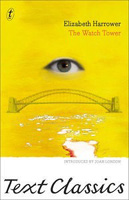 |
I had dinner recently with W.H. Chong, cover designer for Text Publishing, and he was extolling the virtues of a book that Text were about to re-issue in their Classics line. The book was The Watch Tower by Elizabeth Harrower. "Never heard of it," I said. He just looked at me like I was an idiot. I checked up on the author when I got home. And, yes, he was right, I really am an idiot. As the book is being distributed Gay Alcorn interviewed the author for "The Age": |
Harrower is 84, tall and straight-backed, dressed stylishly in black pants, black top and a neat neck scarf. Her fourth and last novel, The Watch Tower, was published in 1966. This month it was re-published as a Text Publishing Classic, one of 30 remarkable, and mostly out of print, Australian books. She is immensely pleased, having thought that nobody would again talk about Elizabeth Harrower, novelist, until she was dead.
..Harrower was close to Patrick White, in 1973 Australia's first winner of the Nobel prize for literature. She was friends with celebrated writers Christina Stead and Kylie Tennant and writer and political adviser Richard Hall. She was a close friend, too, of painter Sidney Nolan and his wife Cynthia. Her friends urged her to write, and were cross when she did not.
''Patrick was always very angry with me for not writing, enraged, he was horrible. Only people who really care about you care about whether you are doing that or not.'' She brings out a book White inscribed for her in 1986. ''To Elizabeth, luncher and diner extraordinaire. Sad you don't also WRITE.''
Over three hours, first at her apartment overlooking a glorious Sydney Harbour, then at lunch at a local restaurant in the inner city, Harrower tries to explain what happened. It is the first interview she has given for more than 20 years, and she talks about everything - and quizzes her interviewer in detail about all of life's doubts and joys - but she is reluctant to analyse her books and there are long pauses when she grapples with the question of why she stopped writing.
It's not as though she ran out of things to say - ''there were probably too many things to say''. It's not as though her work was poorly received - her second novel, The Long Prospect, was described as ranking ''second only to Voss as a post-war work of Australian literature''. It's not as though she was busy raising children - she never married and is childless. She doesn't dismiss the question as irrelevant, either. ''It's a very good question,'' she says.
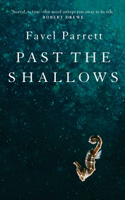 |
Past the Shallows Favell Parrett Hachette 2011 |
[This novel has been shortlisted for the 2012 Miles Franklin Award.]
From the publisher's page:
Hauntingly beautiful and told with an elegant simplicity, this is the story of two brothers growing up in a fractured family on the wild Tasmanian coast. The consequences of their parents' choices shape their lives and ultimately bring tragedy to them all.
Harry and Miles live with their father, an abalone fisherman, on the south-east coast of Tasmania. With their mum dead, they are left to look after themselves. When Miles isn't helping out on the boat they explore the coast and Miles and his older brother, Joe, love to surf. Harry is afraid of the water.
Everyday their dad battles the unpredictable ocean to make a living. He is a hard man, a bitter drinker who harbours a devastating secret that is destroying him. Unlike Joe, Harry and Miles are too young to leave home and so are forced to live under the dark cloud of their father's mood, trying to stay as invisible as possible whenever he is home. Harry, the youngest, is the most vulnerable and it seems he bears the brunt of his father's anger.
Reviews
Juliette Hughes in "The Brisbane Times": "It's always a good sign when you are looking forward to getting home to read the next chapter in a novel. Past the Shallows, Favel Parrett's first novel, opens lyrically: 'Out past the shallows, past the sandy-bottomed bays, comes the dark water - black and cold and roaring.' As opening sentences go, it's a damn good one, plunging us straight into place. Then Parrett gets down to business, telling the story in a way that is sometimes linear, sometimes impressionistic, yet always clear...This is an impressive debut. Parrett's writing has a real voice, with power to evoke feeling, place and character. She is capable of refreshing narrative clarity, yet at other times surprises with an intense lyricism that is never self-indulgent. Everyone is put to the test - pushed to the edge physically and spiritually in a series of events and revelations that affect not only the characters but also the reader. This book is that rare thing, a finely crafted literary novel that is genuinely moving and full of heart."
Louise Swinn in "The Australian": "It is not hard to see why Favel Parrett was awarded a mentorship by the Australian Society of Authors while writing Past the Shallows, for this is an unequivocally strong debut novel...Past the Shallows is recognisable in many ways, from structure to character types and atmosphere. Set on the coast in an outdoor landscape that is familiar, where phones and computers aren't much part of life, it is in many ways a timeless place. It is a story existing almost as far from the contemporary world as it's possible to write, traditional as it is in plot and setting...And, interestingly, this novel by a woman about a family of men, pitching to a female-dominated fiction readership, is almost devoid of female characters...Parrett has the confidence and ability to leave out some of the story so that the tale's full heft is a gradual revelation. Her skill at weaving the plot combined with her understanding of the nuances of the internal workings of her characters means there is some grey where, in lesser hands, it might easily have just been black and white. That there can exist in the reader a shred of pity for the father at the conclusion of the novel is testament to Parrett's good judgment as a storyteller."
Rachel Edwards on ABC Radio National's "Book Show": "Tasmanian fiction has almost become a genre in its own right. It is considered synonymous with the gothic, it features both extreme weather and an extreme natural environment and utilises the physical isolation of the characters as a device for the author to intensify the story. Cate Kennedy' marvellous The World Beneath and most of Richard Flanagan's books tick these boxes and so does Past the Shallows. And it does so successfully...Past the Shallows has a distinct voice, is a carefully crafted story with well formed characters. I loved it to pieces and would counsel the reader not to finish it while in a public place."
Lisa Hill on the "ANZ LitLovers" weblog: "Favel Parrett is one of a new generation of Australian writers, and she has made an impressive debut with her first novel, Past the Shallows. It is raw, tough and uncompromising, and hard to put down: I read it in a single sitting...It is a melancholy novel, but as Robert Drewe says on the cover blurb, it seems real and true, and it 'sweeps you away in its tide'."
Estelle Tang on "3000 Books": "Thanks to Favel Parrett for making me actually start weeping uncontrollably on public transport."
Interviews
Linda Morris in "The Sydney Morning Herald".
"Booktopia" weblog
Other
The publisher's reading group notes.
The author introducing her novel on YouTube:
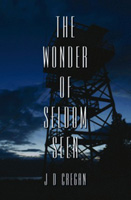 |
J. D. Gregan The Wonder of Seldom Seen University of Western Australia Press, 269 pp. Source: review copy Review by Michael Freedman |
It is difficult to write a review of The Wonder of Seldom Seen, because it does not easily fit into an accepted literary genre. It is a crime novel, because it has crime in it - in fact it has a number of murders, most of which occur at the beginning of the novel, often with only vague affinity with the plot. It is a thriller, because elements of the novel do tend to raise the heart rate. It is a quintessentially Australian novel, not just because it is set in this country, but because Australian references are liberally strewn throughout its pages. It is also a novel where the protagonist seeks reinvention of himself, and it is perhaps here where the novel finds its meaning.
Characterisation of secondary characters is rich, which is necessary because for much of the novel the main character is not particularly likable. Miles Jordon is a writer who gives up on his old life, and strikes out into country Victoria in search of a new one. At the beginning he is sympathetic - his marriage has crumbled, he is broke, he suffers from terminal writer's block, and he has not been able to replicate the success of an award-winning novel written years earlier. Additionally, he loves his dog, which, consistent with the author's determination to introduce Australian references at every opportunity, is a Blue Heeler.
But Miles is unlikable largely because of the choices he makes. He indulges in adultery with little regard to the consequences, and then vanishes with no warning. He evades pursuing police officers, inviting further suspicion, and thoughtlessly draws people he encounters who are unfamiliar with his past into his deception. For large portions of the novel he continues his voyage of self-discovery with little regard to those around him, and a key plot point in the novel is Miles' search for redemption.
Parts of the novel are confusing, and it is not clear whether this is intentional. At times key plot changes are improbable, and the relevance of certain characters and plot devices unclear. It is almost as if the author had too many ideas, and tried to fit as many as possible into this novel. This can sometimes work, but only when each idea has a common thread. Perhaps clarity intervenes on subsequent readings, but at first blush there seems to be too much happening at once. Indeed, this must be the first novel I have ever read which included both an Irish hitman and an alien artefact.
There is however a certain charm to The Wonder of Seldom Seen. It would a mistake to miss the significance of the word "wonder" in the title. Perhaps it is unfair, and misses the point, to expect gritty realism in a novel that follows the path of redemption in an otherwise flawed main character. The setting itself encompasses a certain degree of isolation, which is always interesting in a novel. The characters are mostly well-drawn, and the novel moves along at a good pace. The problem is that it is never entirely clear what the author wants his novel to be. Like its protagonist, the novel never really settles down. It is always situated outside the box, but lacks foundation.
The shortlists are:
Older Readers Short List
Ishmael and the Hoops of Steel, Michael Bauer (Omnibus Books, Scholastic Australia)
A Straight Line to my Heart, Bill Condon (Allen & Unwin)
The Golden Day, Ursula Dubosarsky (Allen & Unwin)
The Dead I Know, Scott Gardner (Allen & Unwin)
Ship Kings: The Coming of the Whirlpool, Andrew McGahan (Allen & Unwin)
When We Were Two, Robert Newton (Penguin Books)
Younger Readers Short List
Crow Country, Kate Constable (Allen & Unwin)
Brotherband: The Outcasts, John Flanagan (Random House Australia)
Nanberry: Black Brother White, Jackie French (Angus & Robertson Harper Collins Publishers)
The Truth About Verity Sparks, Susan Green (Walker Books Australia)
Bungawitta, Emily Rodda (Omnibus Books, Scholastic Australia)
The Golden Door, Emily Rodda (Omnibus Books, Scholastic Australia)
Early Childhood Short List
The Runaway Hug, Nick Bland, Ill. Freya Blackwood (Scholastic Press, Scholastic Australia)
Come Down, Cat!, Sonya Hartnett, Sonya, Ill. Lucia Masciullo (Puffin Books)
That's Not a Daffodil!, Elizabeth Honey (Allen & Unwin)
The Last Viking, Norman Jorgensen, Ill. James Foley (Fremantle Press)
No Bears, Meg McKinlay, Ill. Leila Rudge (Walker Books Australia)
Rudie Nudie, Emma Quay (ABC Books, HarperCollins)
Picture Book Short List
Look, a Book!, Freya Blackwood, Text. Libby Gleeson (Little Hare Books, Hardie Grant Egmont)
The Dream of the Thylacine, Ron Brooks, Text. Margaret Wild (Allen & Unwin)
For All Creatures, Rebecca Cool, Text. Glenda Millard (Walker Books Australia)
A Bus Called Heaven, Bob Graham (Walker Books Australia)
No Bears, Leila Rudge, Text. Meg McKinlay (Walker Books Australia)
Flood, Bruce Whatley (Scholastic Press, Scholastic Australia)
Eve Pownall Award for Information Books Short List
The Little Refugee, Anh Do & Suzanne Do, Ill. Bruce Whatley (Allen & Unwin)
One Small Island: The Story of Macquarie Island, Alison Lester & Coral Tulloch (Penguin Group)
Surrealism for Kids, Queensland Art Gallery (Queensland Art Gallery/Gallery of Modern Art)
Bilby Secrets, Edel Wignell, Ill. Mark Jackson (Walker Books Australia)
Fromelles: Australia's Bloodiest Day at War, Carole Wilkinson (Black Dog Books)
Playground, Nadia Wheatley (Ed), Ill. Ken Searle (Allen & Unwin)
The winners will be announced during Book Week in August.
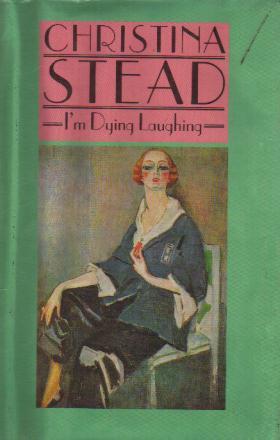
I'm Dying Laughing by Christina Stead, 1986
Jacket painting: Portrait of Madame Jasmy by Kees van Dongen
Virago edition 1986
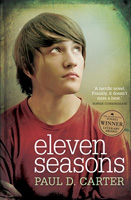 |
It was remiss of me last week to fail to mention that the winner of the 2012 Australian-Vogel Literary Award had been announced as Eleven Seasons by Paul D. Carter. I put it down to age and senility. |
'Some guys are good at school and telling jokes or they have the latest stuff. Others are cricketers and basketball players: they can do things with the ball that make their classmates talk about them when they're not around. His thing is football. He becomes the centre of whichever team he plays for: he becomes the advantage.'
MELBOURNE, 1985. Jason Dalton sits on his bed and counts his football cards, dreaming of the day he too is immortalised in the public eye. He's young and gifted, a natural player who can do anything with the ball in his hand. If only everything else in his life was as obvious to him as playing.
GOLD COAST, 1991. The bottom has fallen out of Jason's life; he's now a high-school dropout, tired and wasted on the Gold Coast, with an explosive family secret still ringing in his ears. He needs to get his life back. But first he needs to find out who he is.
Travers didn't want her film to be made into an animated feature and held out for 14 years before allowing Disney to make the Julie Andrews version. She hated it.
The Australians listed this year are:
Young Adult Book
Goliath by Scott Westerfeld
Anthology
Eclipse Four edited by Jonathan Strahan
Engineering Infinity edited by Jonathan Strahan
Editor
Jonathan Strahan
Artist
Shaun Tan
The winners will be announced over the weekend of June 15-17 in Seattle.
You have my deepest sympathy;
For, in the days when I was yongue,
Tho' werds tripped glibly from my toung,
Whene'er I came to spell them oubt
I found myself in dreadful dout
Trigh as I wood, strive as I mite,
I cood not tell the rong from wright.
I never new, I never saugh
A spelling book, but I cried "Faw!
There's not won rool in awl the lot
That has not sum exceptions got."
I red the lessons threw and threw,
Yet when into a man I grough
I never coodd lern hough to spell
Dou yew? I hope yough do -- and well.
First published in The Herald, 8 July 1930
The works are:
Blood by Tony Birch
All That I Am by Anna Funder
Foal's Bread by Gillian Mears
Cold Light by Frank Moorhouse
Past the Shallows by Favel Parrett
There has also been a slight change in emphasis for the award. According to Franklin's will the award will be presented to the best Australian "published novel or play portraying Australian life in any of its phases". This has generally been interpreted as having a mainly geographical or character-based focus. In other words, having a work set in Australia or featuring Australian characters made it eligible. Now the emphasis is on allowing judges to include works that display Australian life, setting, characters, history, values or mindset.
Seems like a reasonable approach to me.
Peter Carey lists Stephen Haff, a school-teacher in Brooklyn, as his hero for "The Guardian".
The British Cartoon Archive, out of the University of Kent in the UK, has a set of about 154 cartoons by Will Dyson, and over 800 by David Low.
Peter Corris explains the difference between "literary" and "popular" fiction over at "The Newtown Review of Books".
Parts of "Little Lon" are set to be demolished. C.J. Dennis wrote about the area in his verse novel The Songs of a Sentimental Bloke, though I'm not sure he actually mentioned the VD Clinic.
The shortlisted works are:
Good Living Street: The Fortunes of My Viennese Family by Tim Bonyhady
Michael Kirby: Paradoxes & Principles by A. J. Brown
Sydney by Delia Falconer
How to Make Gravy by Paul Kelly
An Eye for Eternity: The Life of Manning Clark by Mark McKenna
The Many Worlds of R. H. Matthews: In Search of an Australian Anthropologist by Martin Thomas
The winner of the award will be announced on May 14th, during the Sydney Writers' Festival.
I'm guessing the name change came about due to the similarilty between the novel's title and the 2002 Hugh Grant film "About a Boy", but who really knows. I sure don't remember any elephants in the book. There doesn't appear to be any mention of the film on the "International Movie dataBase".
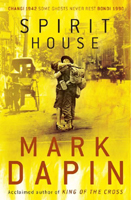 |
Spirit House Mark Dapin Pan Macmillan 2011 |
[This novel has been longlisted for the 2012 Miles Franklin Award.]
From the publisher's page:
David is thirteen and confused. His mum has gone off with her lover and sent David to his grandparents in Bondi to give her new relationship some "space". Sometimes it breaks your heart to understand.
David's grandfather, Jimmy, a Jewish war veteran and survivor of the Thai-Burma railway, is seventy. Haunted by the ghosts of long-dead comrades, the only person he can confide in is a thirteen-year-old from a different world. Sometimes it breaks your heart to be understood.
Spirit House is a story of Changi and the Thai-Burma railway, of old men living with the horrors of their past, and a boy making sense of the daunting business of growing up.
Funny, wise, disturbing and deeply moving, Spirit House is the brilliant new novel by the award-winning author of King of the Cross.
Reviews
Stephen Romei for "The Australian": "Mark Dapin is best known as a columnist and feature writer for the Fairfax press, a role where making stuff up is called for only occasionally...On the strength of his second novel, Spirit House, he should make the leap to full-time fiction. If this book is not on next year's literary prize lists I will be surprised...Dapin's first novel, King of the Cross (2009) was a high-rent crime thriller: gritty, smart and funny but with a soggy patch towards the end. Some of its characters have supporting roles in Spirit House, but this is a much different and more ambitious book, one that cares about surprising things, such as love and beauty."
Rob Minshull for ABC Bisbane: "A modern Australian classic deserves the title because of the story it tells, the way it is told and the way in which reflects who we are. Authors like Murray Bail or David Malouf, Bryce Courtney or Colleen McCullough are great Australian writers and books like Voss by Patrick White or Cloudstreet by Tim Winton, The Drowner by Robert Drewe or The Secret River by Kate Grenville are classic Australian novels...Spirit House is also one of those novels and Mark Dapin is one of those writers. This is a book destined for classic status in every sense of the word. It is powerful, poignant, moving, tragic and intensely distressing. It is a feast of a story which will almost simultaneously move you to tears and bring a smile to your face."
Sue Turnbull for "The Sydney Morning Herald": "Fairfax columnist Mark Dapin is editor of The Penguin Book of Australian War Writing, which helps to explain the impulse behind this novel, which opens with an anonymous diary entry from 'Siam' in 1941. Written in the purple prose of a man pleased to parade his education, this passage introduces key themes that will play out in the present of 1990. The first is that of the Spirit House itself, an altar intended to placate whatever gods there might be to placate; and second, the savage beating of a soldier in Changi by Korean guards under orders from the Japanese. Spirituality and savagery are brutally juxtaposed, a strategy Dapin uses throughout the book, punctuated by moments of high comedy...Dapin's achievement is to bring the past to life through memorable moments and characters in whom one can believe. The use of comedy to juxtapose the brutality of war is well measured, leading to a resolution with the past and a kind of grace for those in the present. There are times, however, when the structure of the narrative seems a tad overwrought. Indeed, I wonder whether the intermittent use of the anonymous war diary (the author of which is revealed in the final pages) is necessary. Jimmy and David might be the only witnesses to war we need."
"Web Wombat" weblog: "Spirit House by Mark Dapin is about demons, demons that haunt and torment an elderly war veteran's thoughts and memories as he tries to come to terms with the loss, pain, and intense grief he suffered from events that occurred over 40 years ago when he was a WWII prisoner of war in the notorious Changi prison...For those who will, thankfully, never experience the horrors of war it is beneficial to be able to gain some small insight into what so many of our forefathers went through and then in many cases carried to their graves."
Chris Flynn on ABC Radio National's "Book Show": "Sometimes we have a tendency to forget the breadth of talented writers we have in Australia. Take Fairfax columnist Mark Dapin for example, who is one of the country's most recognisable and consistently funny journalists. Those who enjoy his column's stylistic footnote-heavy quirks will have flocked to his unconventional first novel King of the Cross which rightly won 2010's Ned Kelly First Fiction Award. In it, a cadet reporter from the Australian Jewish Times interviews Jake Mendoza, legendary Sydney crime lord. The resulting memoir is a sly wink to real world gangland figures...Mendoza pops up again as an enigmatic bit player in Dapin's second novel Spirit House which is frankly just wonderful. Why? It's funny, truthful, upsetting, moving and sheds a whole new light on an aspect of Australian war history that I thought had been amply covered a hundred times already, namely Changi prison in Singapore and the construction of the Thai Burmese railway by Allied prisoners."
Rebecca Butterworth for "artsHub": "Spirit House is probably the best example of what a fiction writer can do for fact - not only bring it alive, but drag it to its feet and boot-camp it into the best shape of its life - that I have ever experienced. And 'experienced' is a more accurate word to apply to Spirit House than 'read'...Spirit House is worth reading on so many levels; it's difficult to focus on just one. Dapin takes the novelist's goals of heart, humour, and significance and shows off with them. This book is about pain - significant, lifetime pain - and it is also incredibly funny. "
Interviews
Melanie Sheridan for "The Australian Jewish News".
"Mellygoround" weblog.
John Purcell on the "Booktopia" weblog.
Other
The author describes the story behind the book for "Readings".
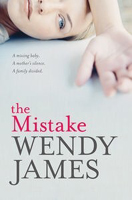 |
Wendy James, who I interviewed here on "Matilda" way back in 2006. Now she has just had her fourth novel, The Mistake, published by Penguin. Recently she spoke to Angela Savage: |
Out of the Silence mixes characters from real life -- like feminist suffragette Vida Goldstein and working-class country girl Maggie Heffernan -- with fiction, producing a novel that is compelling and informative. How did you come across these characters?
I'd read about Maggie Heffernan in books and articles about 19th century Australian women's history. Her story has been written about fairly frequently; it's almost a case study. I'd read about Goldstein in other contexts as well, because of her work for the suffrage and also as a pacifist, but the unexpected connection between these two very different women was immediately exciting. So many things that interest me about the nineteenth century (and ours, too) -- in particular issues surrounding class and gender -- could be explored using a compelling real life story.
You refer to the Lindy Chamberlain case in The Mistake in exposing the media's role in shaping public opinion. Were there any other real life cases or characters that inspired the novel?
The novel's initial inspiration came from the story of Keli Lane, the water-polo champion who was recently convicted of murdering her infant daughter, Tegan. Tegan hasn't been seen since she was discharged from hospital with her mother in 1996, and despite extensive police searches, authorities have been unable to locate her. Lane herself maintained throughout the period of investigation (though her story changed) that the child had been adopted out unofficially. The case is certainly sensational, but it was the attitude of some media -- including various internet sites -- that really struck me. The focus was all on Lane's perceived "character" -- promiscuous, secretive, ambitious, a liar -- rather than the available, and completely circumstantial, evidence. Like Chamberlain before her, Keli Lane was found guilty in the court of public opinion even before she went to trial.
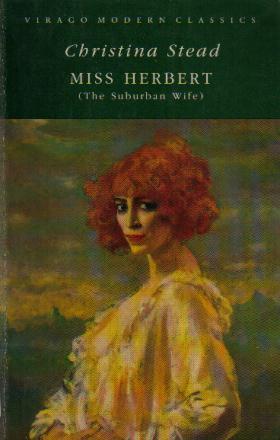
Miss Herbert (The Suburban Wife) by Christina Stead, 1976
Cover: The Marchesa Casati, 1918-19 by Augustus John
Virago edition, 1992.
